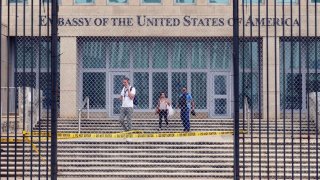
- A growing number of U.S. diplomats and their support staff are reportedly hearing strange sounds, steady pulses of pressure in their heads and a number of other bizarre physical sensations with hallmarks of the “Havana syndrome.”
- "...these attacks have stepped-up in their brazenness,” said Frank Figliuzzi, a former assistant director for counterintelligence at the FBI.
- “We've got to get to the bottom of it ,we've got to have discernible medical records that say, yes, you were attacked, and we need to lay hands on who's doing this,” Figliuzzi said.
Frank Figliuzzi, a former assistant director for counterintelligence at the FBI, called for greater coordination within the U.S. government to combat the growing number of mysterious soundwave attacks against Americans dubbed as "Havana Syndrome."
"I still don't see the kind of coordinated, across agency, government-wide approach to this where there's a central medical review that's done, no matter which agency you're from, if you've been impacted, and look, these attacks have stepped-up in their brazenness," Figliuzzi said.
Get DFW local news, weather forecasts and entertainment stories to your inbox. Sign up for NBC DFW newsletters.
Figliuzzi, an NBC News national security analyst, gave examples of the increasingly flagrant attacks against high-ranking U.S. officials. One attack occurred during a trip to India in September with CIA Director William Burns. Another potential attack delayed Vice President Kamala Harris' trip to Vietnam in August.
Havana Syndrome has been impacting U.S. officials for the past five years. Back in 2016, diplomats in Cuba reported hearing strange sounds, steady pulses of pressure in their heads and a number of other bizarre physical sensations. They suffered lasting side-effects from those direct energy attacks. In some cases, diplomats noticed a sharp deterioration in their hearing and vision, headaches, vertigo and even brain damage.
The White House reportedly sent a warning to U.S. personnel that Havana Syndrome is serious, widespread and poses a real danger to American diplomats and intelligence officers both at-home in the U.S. and abroad.
Money Report
Figliuzzi told CNBC's "The News with Shepard Smith" that it's essential to find the perpetrators as quickly as possible.
"We've got to get to the bottom of it, we've got to have discernible medical records that say, yes, you were attacked, and we need to lay hands on who's doing this," Figliuzzi said.
The White House did not immediately respond to CNBC's request for a comment.






